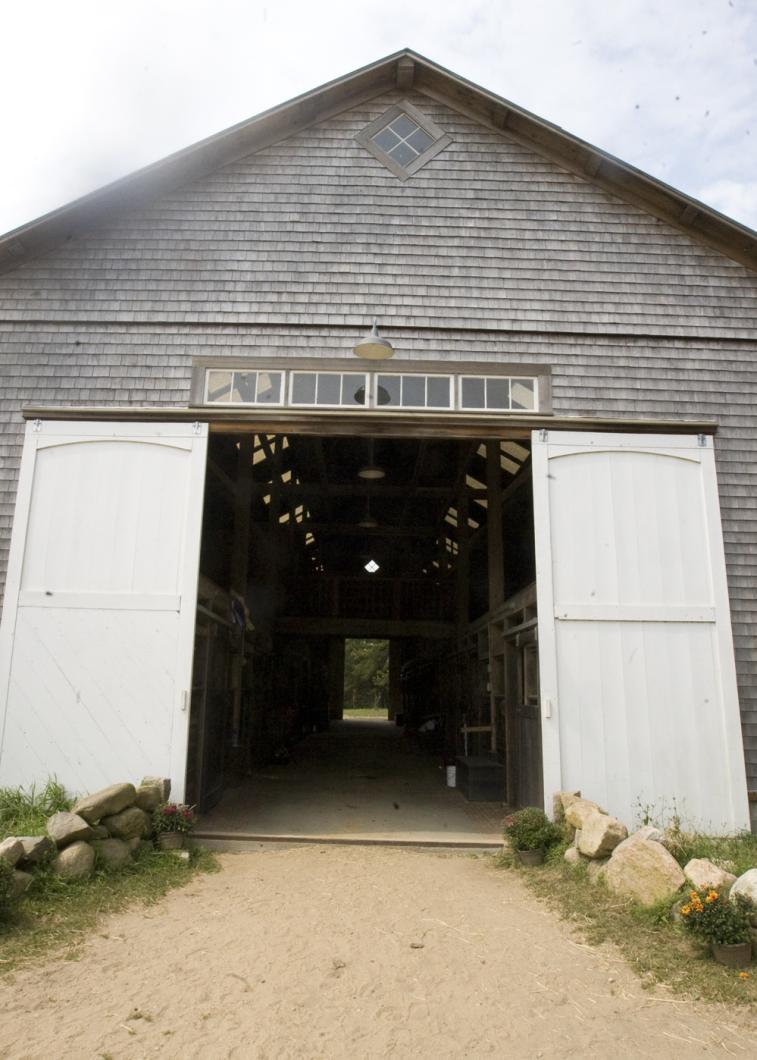The Martha’s Vineyard Land Bank is seeking legal advice on whether major changes being carried out to Crow Hollow Farm by its new owner breach an agricultural preservation restriction (APR) on the property.
The land bank acquired the APR from the previous owners, the Look family, in 2002, for $403,000. Until recently Samantha Look ran a riding school on the property.
Steven Rattner, a New York city financier and longtime seasonal resident of West Tisbury, recently bought the property for $2,300,000. Mr. Rattner also intends to use Crow Hollow as a horse farm, but has undertaken extensive earthworks to expand the facility. Over recent weeks, thousands of tons of materials have been brought in, and existing riding rings and paddocks have been leveled by heavy equipment.
To date, according to a letter to the land bank from Mr. Rattner’s attorneys, work has included the cutting and clearing of trees and other vegetation, regrading (but not removal) of soil, the laying of a new stone dust footing in the equestrian ring and installation of new irrigation lines.
The riding ring is being enlarged to 120 by 200 feet and reoriented from east-west to north-south.
All the work, according to the lawyers, is consistent with the terms of the APR.
But a bare majority of the land bank commission as well as several neighbors, are not so sure.
At a meeting of the land bank board on August 23, a motion was made to refer the issue to counsel, but deadlocked 3 to 3. Subsequently the seventh member, Carlos Montoya of Aquinnah, was consulted and opted to have the issue referred to legal counsel.
In essence, the issue comes down to an interpretation of whether the use Mr. Rattner is making of the property amounts to agriculture.
Minutes of the August 23 meeting noted that the original APR specifically related to the property’s use as a horse farm.
However, it also prohibited excavation and like activities except in connection with the agricultural use of the premises, as well as activities detrimental to the future potential agricultural uses or to water or soil conservation.
And for several years now, the land bank has not entered into APRs over horse farms on the basis that they amount to recreational rather than agricultural use.
At another meeting of the land bank last evening, four neighbors to the Rattner property raised other questions.
Jay McGurren and Gary Montrowl were concerned about a view easement, currently impeded by some of the work. They questioned assurances that the views would be restored after the project was complete.
Mr. Montrowl also was concerned about the upkeep of an ancient way which runs through the property.
Prudy Burt, a neighbor and also member of the West Tisbury conservation commission, declared the work being done on the property amounted to a “massive alteration” of the land. She said a steady stream of trucks had run for eight hours a day in and out of Crow Hollow over the past week and a half, bringing in 2,500 tons of gravel.
She said three and a half to four acres of the property now had been “altered forever in such a way as to preclude agricultural activity.”
Ms. Burt suggested a horse farm did not amount to agriculture, but noted the previous owner at least used it for commerce, giving riding lessons.
It is unknown at this stage whether Mr. Rattner intends any such engagement with the public, but Ms. Burt doubted it.
“The idea of a millionaire being able to buy into an APR protected piece of land and then use it for his private recreational use, while enjoying the tax benefits . . . I do find a little offensive,” she told the land bank commission.
Tara Whiting, who also is a member of the conservation commission, said she was frustrated that the land bank had not been more “proactive” in monitoring what the Rattners were doing with the farm.
“We have a long history with the Rattner family of violation after violation after violation,” Ms. Whiting said.
But land bank executive director James Lengyel defended the organization, saying it had acted as soon as it received complaints from neighbors.
But the land bank is somewhat constrained, Mr. Lengyel said, and could do nothing to stop the owners cutting vegetation of what was intended as farmland.
Mr. Lengyel said all the concerns raised would be passed on to legal counsel.
The land bank commission now will await the legal opinion from Boston attorney Eric Wodlinger.




Comments
Comment policy »